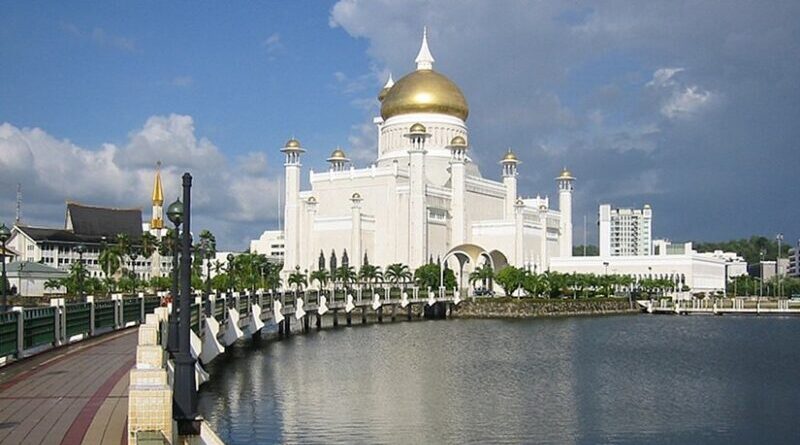Brunei’s Stagnant Economy Is Ripe For Change – Analysis
By Wee Chian Koh
Brunei’s post-pandemic recovery has been weaker than expected. The economy grew only marginally in 2023 — after contracting the previous two years — with the level of output lower than a decade ago. The economic stagnation raises questions about Brunei’s future prosperity. The hydrocarbon-based economic model, which has served the country well for decades, is ripe for change.
Brunei’s economy has struggled to recover despite the country’s success in managing the COVID-19 pandemic. Growth has been revised downwards repeatedly, reflecting major disruptions in oil and gas production and challenges in the rejuvenation of offshore fields. Crude oil production has fallen from a peak of 220,000 barrels per day in 2006 to less than 90,000 barrels per day in 2023. Natural gas production follows a similar trajectory.
Downstream activities, which have been a key growth driver since the start of oil refinery Hengyi’s production in 2019, also declined significantly in the first half of 2023 due to scheduled maintenance of a large petrochemical refinery plant.
Likewise, the tourism sector has been slow to recover. International tourist arrivals to Brunei reached a lacklustre 35 per cent of pre-pandemic levels in the first half of 2023, well below the 60 to 70 per cent in other ASEAN economies.
Nonetheless, there were some bright spots in an otherwise underwhelming 2023. The much-anticipated Phase 2 of Hengyi’s petrochemical project was finally inked in November, which will boost the country’s economic diversification efforts. But some argue that the multibillion-dollar Chinese investment — the largest foreign direct investment in Brunei — is a hydrocarbon-related project that shifts Brunei’s dependence on upstream oil and gas downstream, while increasing its reliance on China.
Meanwhile, the new Salman oilfield was reported to have begun production. This can help to arrest — but not reverse — the trend decline in oil production.
Outside of the oil and gas sector, the country’s first shipment of chicken eggs to Singapore in February 2023 was a significant milestone, following the success of aquaculture exports in recent years. Brunei is 100 per cent self-sufficient in eggs and broilers, and 85 per cent self-sufficient in fisheries.
Despite these positive developments, the upstream oil and gas sector — which accounts for 80 per cent of total exports and government revenue — will continue to shrink as offshore oil and gas fields mature in the coming decades, and along with that a reduction in foreign exchange and fiscal space.
As a small economy with barely half a million people, Brunei will always have to sell something internationally to afford the many things its population needs. It is difficult to imagine that refined petroleum, petrochemical, agricultural and fishery products can fill the void left by traditional oil and gas exports. The country may have to be content with lower incomes and standards of living. In fact, per capita gross domestic product (GDP) on a purchasing power parity basis has already fallen by 20 per cent over the past decade. The nation’s lofty goal to be among the world’s top 10 countries in GDP per capita by 2035 is looking increasingly unattainable.
Yet Brunei need not despair and be stuck in industries bequeathed by the past. The global energy transition is a great opportunity for Brunei to reinvent itself. The country is active in pursuing climate change goals, aspiring to reduce greenhouse gas emissions by more than 50 per cent by 2035. But there needs to be a stronger narrative to recognise green growth opportunities beyond meeting emission targets, which for Brunei is an infinitesimally small contribution to the world’s climate agenda.
The world’s decarbonisation drive will transform global production and trade patterns radically. Demand for cleaner goods and services will increase, but supply may be slow to catch up. Countries that can produce green energy cheaply stand to benefit greatly. Abundant sunshine all year round is a natural comparative advantage for Brunei. The cost of solar has declined dramatically, making mass solar power generation economically attractive. Producing green hydrogen is also a possibility but it is still expensive.
Brunei must be willing to take calculated risks and venture into future high-growth industries, such as producing and exporting renewable electricity and hydrogen as well as developing green industrial parks and incentivising global energy-intensive industries to relocate. Carbon capture and storage is another area that can play to Brunei’s advantage, with its large forest cover and geologic formations potentially serving as natural carbon sinks. Policymakers should seriously consider, with a renewed sense of urgency, the vast potential of green growth in jumpstarting the economy, on top of meeting climate pledges.
To be sure, taking this road will be extremely challenging, given the large financing needs, technological uncertainty, regulatory hurdles, limited human resources and other complications. But it offers a real chance to transform the economy — from hydrocarbons to renewables — and in the process, create exciting new job opportunities with high wages.
Brunei’s growth is expected to rebound somewhat in 2024, not least due to the slow COVID-19 pandemic recovery. Policymakers must not seek solace in the improved headline numbers and should avoid letting them detract from taking bold measures to address secular stagnation.
- About the author: Wee Chian Koh is economist at the ASEAN+3 Macroeconomic Research Office (AMRO).
- Source: This article is part of an EAF special feature series on 2023 in review and the year ahead.

